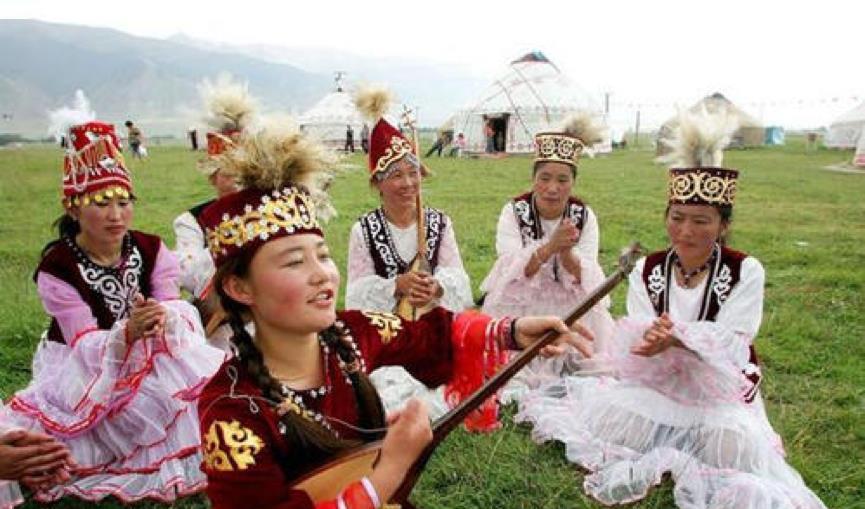It is true that Kazakhs have close ties with the Mongols, but it is not appropriate to say that he is a branch of the Mongols. After all, Kazakhs have a long history and have been influenced by many ethnic groups, so the current Kazakh blood is complex and diverse, and it is not a separate ethnic group.
First, let's talk about their relationship with the Mongols. When Genghis Khan established the Great Mongol State, he divided the territory among his four sons before his death. His sons expanded westward on the basis of their original territories and established the Mongol Empire, which spanned Eurasia. The Kazakh territory was naturally included, and it was first designated as the fiefdom of Genghis Khan's eldest son, Shuchi. Later, due to the death of the fourth Great Khan Möngke, his younger brother Kublai Khan and Ali Buge's struggle for the Khan's throne, the Mongol Empire began to split. At this time, the Kazakh region was controlled by the Golden Horde established by the Second Son of Shuchi Batu.

After two centuries of rule, kazakh natives intermarried heavily with the Mongols. By the beginning of the 14th century, new disputes arose within the Golden Horde, with families incongruous and independent government, and the power of the Khanate weakened, gradually splitting the Blue Horde and the White Horde, while the Kazakh region was under the rule of the White Horde. In 1428, the White Horde collapsed, and the Krehan and Janibek Khans, who originally belonged to the White Horde, established the Kazakh Khanate, and the term "Kazakh" finally came into being. The Kazakh Khanate was formed by the union of three ethnic groups, namely the Great Yuzi, the Middle Yuzi and the Little Yuzi.
The influence of the Mongols on the Kazakhs was indeed great, but they were already a pluralistic ethnic group before the Mongols were united, and after the Mongols they were dominated by other ethnic groups.
The Kazakh people are an ancient people widely distributed in and around present-day Central Asia, and there are traces of primitive human activity in the area as early as the Paleolithic Age. In the Bronze Age, clan tribes appeared in Kazakhstan, among which the Cypriots are recorded in the history of our country. During the Qin and Han dynasties, the Xiongnu were rampant, and the Yueshi people were defeated by them and had to move west to the Kazakh area, and later the Yueshi and the local Cypriots merged with each other and established the Wusun State, which is regarded as the ancestor of the present-day Kazakhs. At the same time, there is also a group of Kangju people in the Syr Darya Valley, located in the southern region of Kazakhstan. They had close contacts with the surrounding countries of China, Sabbath, Kushan, and Rome
By the sixth century AD, the Turks split into The East and West Turks. The Western Turks continued to advance westward and conquered the western regions, while the Kazakh territory was brought under its rule. Since then, the Kazakh land has been more Turkic. Later, the Western Turks were defeated by the Tang Dynasty and replaced by Tuqi Shi. However, turkishi's rule was soon replaced by the Grolo tribe. In addition, the southern part of Kazakhstan is being occupied by the Arabs. Subsequently, the Kazakh region was successively dominated by the Oguz State, the Western Liao, and the Huarazm regimes.
More than 200 years after the establishment of the Kazakh Khanate, it was troubled internally and externally. Not only were the Dzungars and Russians constantly invading it from the west and north, respectively, but there was also internal strife. After the decline of the Hasa Khanate, under the invasion of Russia, Xiaoyuzi was taken away, and Zhongyuzi and Dayuzi also returned to the Qing Dynasty after the Qing court destroyed Geldan. However, in the 1860s, due to the incompetence of the Qing government, Zhongyuzi and Dayuz were successively annexed by Tsarist Russia, and Kazakhs entered the period of Tsarist rule.
In order to consolidate Kazakhstan, Tsarist Russia forcibly moved a large number of Russians into Kazakhstan. At the end of the 20th century alone, there were hundreds of thousands of Russians in the Kazakh steppe, and there were only a million people in the whole of Kazakhstan. Despite the collapse of the Soviet Union and the independence of Kazakhstan, there are still many people of Russian descent. Therefore, today's Kazakhs are by no means from the Mongolian lineage.